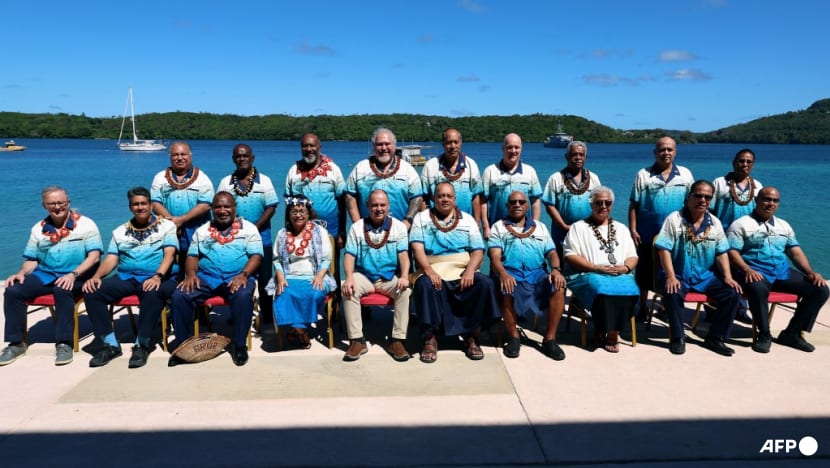Commentary: Trump 2.0 and the Pacific Island countries – what to expect?
After the shock of the 2022 China-Solomon Islands security deal, the United States has increased engagement in the Pacific. Here’s what to expect in Donald Trump’s second term, says retired diplomat Dr Anne-Marie Schleich.

Leaders of the Pacific Island Forum (PIF) pose for a group picture at the end of a retreat in Neiafu, Vava’u, Tonga on Aug 29, 2024. (File photo: AFP/Tupou Vaipulu)

This audio is generated by an AI tool.
SINGAPORE: In the immediate aftermath of the United States election, all Pacific Island leaders sent messages of congratulations to president-elect Donald Trump and expressed hope that cooperation with the new administration would continue.
What are the chances that the improved relationship between the US and Pacific Island countries, carefully nurtured under the Biden administration, will continue to grow?
What are the areas of potential cooperation and possible conflicts of interest? A look at recent US Pacific Islands policies might provide some clues.
THE BIDEN ADMINISTRATION AND PACIFIC ISLAND COUNTRIES
The Biden administration released its Indo-Pacific Strategy in February 2022, the framework for countering Chinese influence, maintaining America's traditional strategic dominance, and signalling its desire to play a greater role in the region.
One tool was to strengthen overlapping minilateral alliances, such as AUKUS and the Quad. Others were newly created, such as the Indo-Pacific Economic Framework for Prosperity (IPEF).
After the shock of the China-Solomon Islands security deal in May 2022, the Biden administration increased its diplomatic and economic engagement with Pacific Island countries. President Joe Biden twice hosted Pacific Island Forum (PIF) leaders at the White House for US-Pacific Summits in 2022 and 2023. The US also announced the US-Pacific Partnership Strategy, a roadmap for strengthening cooperation.
Over the past four years, there have been an unusual number of high-level political visits to Pacific Island countries, including visits by Secretary of State Antony Blinken, Vice President Kamala Harris, and Defence Secretary Lloyd Austin, who was in Fiji in early December. The Biden administration also increased its diplomatic presence, opening embassies in Tonga, Kiribati, Vanuatu and Solomon Islands, and a US Agency for International Development (USAID) office in Fiji.
After aid cuts in the years before, Biden announced a US$810 million aid package over 10 years, including US$130 million for climate change projects. This funding still has not received full congressional approval and its future under Trump 2.0 remains unclear.
In March, Biden renewed the Compact of Freely Associated States (COFA), announcing an unprecedented package of US$7 billion over 20 years for the Marshall Islands, Palau and the Federated States of Micronesia. The US has a long-standing special relationship with these three strategic countries in the Western Pacific, which receive the lion's share of US Pacific aid and investment. COFA will continue to allow the US to provide defence, deploy forces and operate bases there.
CLOSE ALLY AUSTRALIA ASSISTING
America’s ally, Australia, has also been doing the heavy lifting in the South Pacific. Already the biggest aid donor to the Pacific Islands countries, Australia has further increased assistance in the last two years.
To counter China’s influence with its neighbours, Australia has concluded several security and aid deals, among them the recent security agreement with Tuvalu which gives Australia a veto power in Tuvalu’s foreign and security affairs.
In December, Australia concluded a rather controversial agreement with Nauru which gives it veto power of pacts that Nauru might want to conclude with third countries. The five-year deal continues to secure Australia’s detention facility for Australia-bound refugees and comes with a A$140 million budget (US$87 million) and police support for Nauru.
The Australia-Solomon Islands security arrangement, announced recently on Dec 20, will fund A$190 million into the Royal Solomon Islands Police Force and set up a new police training centre in the capital Honiara. This deal is a major achievement of the Labour-led Albanese government to counter the China-Solomon Islands security agreement.
THE SECOND TRUMP ADMINISTRATION: WHAT TO EXPECT?
Trump is likely to focus primarily on the security aspects.
Fiji and Papua New Guinea had become the main beneficiaries of the Biden administration's strategy over the past two years, with landmark defence and security agreements.
Increased economic ties between Papua New Guinea and China will loom large over any potential US disengagement or trade sanctions. The Trump administration can be expected to honour previous agreements, so as not to create loopholes for potential Chinese security-related engagement.
But the new administration must also be mindful of the growing discontent over the use of the Pacific as a strategic theatre for the US and China.
Pacific Island leaders have voiced concerns about ongoing intercontinental ballistic missile (ICBM) testing in the Pacific, complaining about an American ICBM test in November that flew over the Marshall Islands and a Chinese ICBM test in the South Pacific in September.
PIF Secretary General Baron Waqa recently said: "Geopolitical manoeuvring mean nothing to Pacific peoples who have cyclones on the horizon [and] are focused on building resilience, peace and prosperity for our families, communities and nations."
The three COFA nations may also come into focus again. Trump's first administration regarded the ability to use US military installations in these three island nations as an important part of his Indo-Pacific strategy. He hosted the leaders of the three countries at the White House in May 2019. This view of their "usefulness" to the US is likely to prevail.
However, a longstanding practice has been to allow citizens of the three COFA states to live and work in the United States and access federal benefits like food stamps and healthcare. This may be at odds with the proclaimed immigration agenda of the second Trump administration. A partial US revision of the COFA articles is unlikely to be acceptable to the three partner countries.
There is a strong possibility that the second Trump Administration will leave Biden’s 14-member economic initiative IPEF. Fiji, being the only Pacific Islands member, will probably search for alternative trade agreements.
CLIMATE ACTION THE BIGGEST OBSTACLE
The biggest obstacle to the relationship between the US and Pacific Island countries will be climate change, as their positions are diametrically opposed.
Trump is expected to withdraw from the Paris Agreement a second time and focus US energy policy on oil and gas.
Pacific Island countries have become leaders in the global fight against climate change, such as in two United Nations groups – the Alliance of Small Island States (AOSIS) and Small Island Developing States (SIDS).
Tuvalu's prime minister has called on major polluters to make concrete commitments to phase out fossil fuel production. Current policies – leading to new coal, oil and gas projects - are a "death sentence", he insisted.
Samoa rallied UN member states to press for more progress on "loss and damage finance". And it was Vanuatu that brought about a landmark UN resolution, backed by 130 countries, on climate justice and countries' obligations to address climate change.
Under the second Trump administration, there will be difficult discussions at the UN between AOSIS, SIDS and the US. Expect also the Biden climate change package for Pacific Island countries to be reduced or scrapped.
PRAGMATIC COOPERATION FOR A LOUDER VOICE
The second Trump administration will have to take into account that Pacific Island countries have become more pragmatic and have more options than in the past. Geopolitical wrangling has also meant that other donors, both governmental and non-governmental, are willing to step in.
PIF countries have shown that they can overcome some of their internal regional divisions, coordinate their positions and work with like-minded countries outside the Pacific. This pragmatic “New Pacific Diplomacy” has strengthened their climate voice in UN negotiations.
The geopolitical power competition has provided Pacific Island leaders the opportunity to leverage their unique position to advance some of their most pressing issues, climate emergency and infrastructure investment.
No doubt, they will use it in the next four years.
Dr Anne-Marie Schleich is an Adjunct Senior Fellow at the S Rajaratnam School of International Studies (RSIS), Nanyang Technological University, Singapore. She is a retired German diplomat and editor of Perspectives of Two Island Nations: Singapore-New Zealand (World Scientific).



















